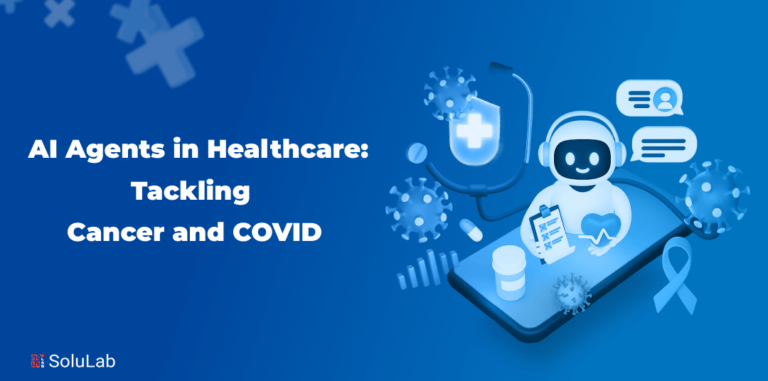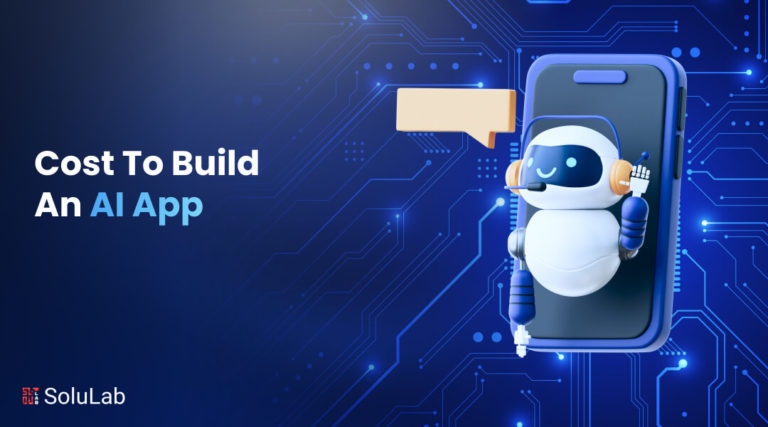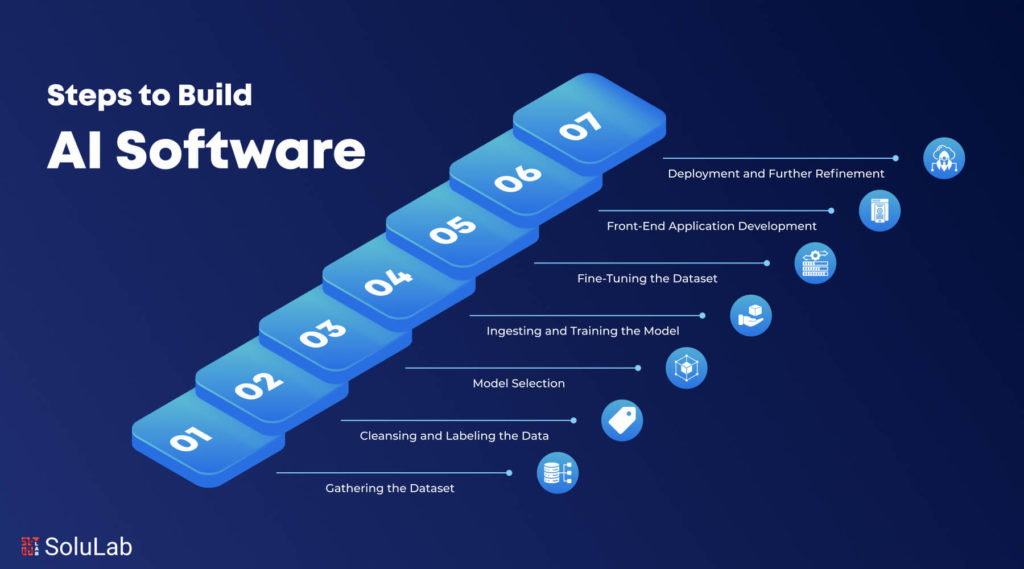
Artificial intelligence and machine learning have become extremely popular during the last ten years. This growth might be ascribed to the noteworthy progression in the extensive integration of cloud computing. These developments in technology have opened the door for the creation of remarkable artificial intelligence (AI) systems that are able to complete remarkable jobs. Every day brings new problems that stretch the limits of these autonomous systems, from AI-powered art and designs to AI-generated content created with Conversational AI systems.
Let’s discuss historically significant inventions that changed society, such as the printing press and the personal computer. Similar to how these innovations altered historical conventions, artificial intelligence (AI) is changing society and is quickly emerging as one of the most important areas of software development, with enormous potential for advancement and success for companies worldwide.
A Stanford study claims that over 50% of companies are interested in artificial intelligence (AI) and have successfully incorporated its capabilities into their operational frameworks. Furthermore, for the entire year 2023, over 76% of them want to increase their technological investments. These data demonstrate that artificial intelligence (AI) is a powerful tool that has the potential to completely transform sectors, increase productivity, and take companies to previously unheard-of heights.
Now, this article will assist you in understanding the specifics of how to build AI software. We’ll also look at the benefits of building AI software for your company and also assist you in estimating the associated expenses.
How Businesses Can Streamline Their Operations Using AI Software?
Artificial intelligence software may improve decision-making, speed the accomplishment of your corporate goals, and streamline operations. The market for AI software is predicted to grow to a staggering $2 trillion by 2030, according to Statista. The main uses of AI in the industry that will be enhancing the sector’s total financial standing in the upcoming years are software-related, such as chatbots, AI that generates images, and mobile apps.
Large data volumes may be processed by AI algorithms with ease and speed that exceeds human speed and accuracy. AI software may also be used to assess sales trends, anticipate consumer behavior, and even automate marketing initiatives. With so many potential benefits, purchasing AI software becomes a wise strategic move for businesses and startups trying to gain a competitive edge in the digital world.
Now let’s take a closer look at the benefits of developing AI-powered software for companies.
Benefits of AI Software Development for Different Industries
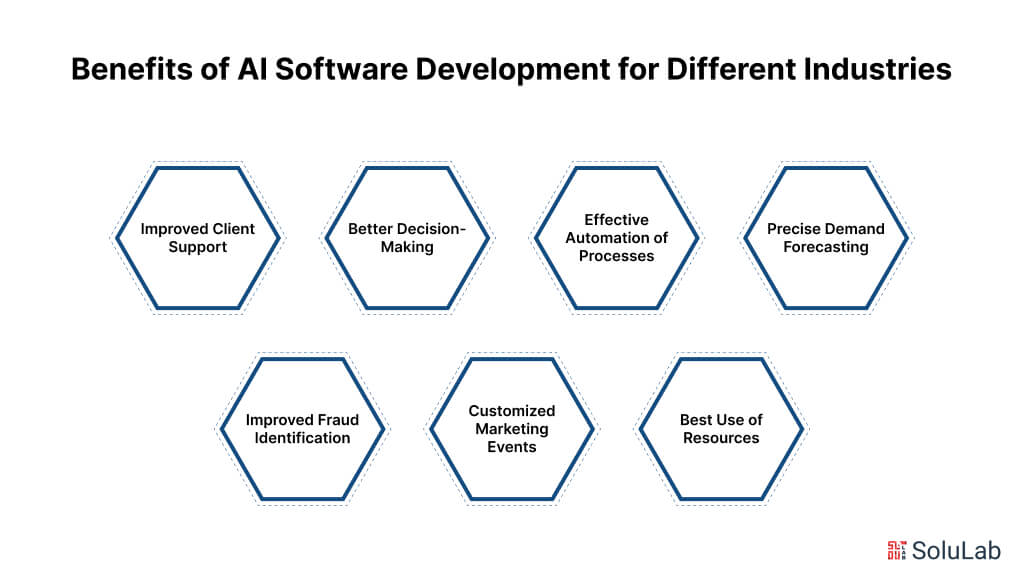
Using artificial intelligence software has revolutionized a number of sectors by providing creative answers to a wide range of problems with the help of custom software development. Let’s examine in more depth the reasons why companies must develop AI software.
-
Improved Client Support
Chatbots with AI capabilities have completely changed customer support. By responding to common questions, recommending products, and assisting with problem-solving, these intelligent technologies greatly increase customer happiness while cutting expenses overall.
-
Better Decision-Making
AI systems for informed decision-making have never-before-seen data analysis capabilities that provide businesses with the critical information they need to make wise decisions. Businesses may optimize operations and make precise forecasts by extracting important information from large datasets via the use of sophisticated analytics and machine learning.
-
Effective Automation of Processes
Organizations may free up stakeholders’ time to concentrate on key goals by automating repetitive operations with the use of Generative AI CRM systems. AI-driven automation improves productivity, reduces mistakes, and expedites procedures in a variety of areas, including data processing, inventory management, and quality assurance.
-
Precise Demand Forecasting
To provide precise demand predictions and effective inventory management, AI building software examines past data, market movements, and outside variables. This optimized inventory and demand forecast enabled by AI streamlines the supply chain, saving money and raising customer happiness.
Read Blog: How to Utilize AI in Demand Forecasting?
-
Improved Fraud Identification
Artificial Intelligence detects fraudulent activity by examining several data sources and real-time patterns. Artificial intelligence-powered fraud detection solutions help businesses stop several types of fraud while protecting sensitive data and financial activities.
-
Customized Marketing Events
One of the most sought-after benefits of developing AI software is the ability to provide organizations with customized marketing campaigns and consumer experiences through AI-driven customization.
-
Best Use of Resources
AI algorithms allow for the efficient distribution of resources for sectors such as logistics and transportation. With the analysis of data and consideration of variables such as traffic patterns, weather, and energy use, they enable organizations to make well-informed decisions, save expenses, and avoid waste.
How Is Artificial Intelligence Being Used in Every Industry?
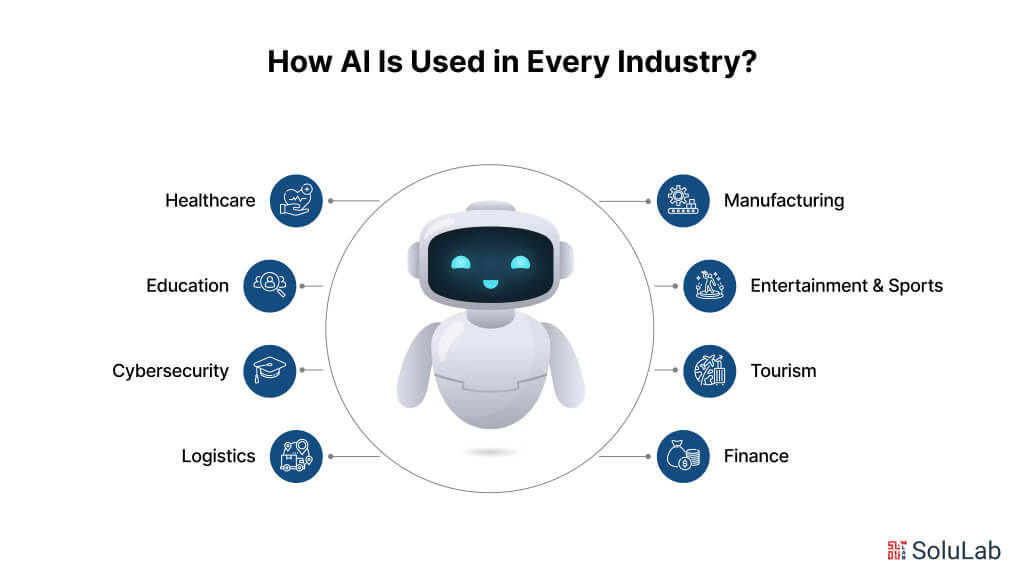
Businesses in a variety of sectors may expand their reach, improve customer happiness, acquire a competitive edge, and discover new opportunities by utilizing AI technology. These are a few examples of how AI software development is used.
-
Healthcare
When we build software with AI, it uses applications to provide real-time patient advice and analyze complicated medical data, AI in healthcare is paving the path for individualized therapies. By using chatbots or AI-powered virtual nurses, organizations may improve patient care and create a more efficient medical consultation process.
-
Manufacturing
Artificial intelligence software for manufacturing streamlines processes raises the caliber of output, and finds problems with manufacturing software. Additionally lowering downtime expenses is predicted maintenance, and computer vision improves real-time quality control overall.
-
Education
Building AI software enables virtual teachers, automates work, and solves academic difficulties to change learning. For a variety of student populations spread around the world, AI in education technology has the potential to completely transform the educational experience.
-
Tourism
AI for tourism may provide data-driven insights, enhance customer service, and customize vacation planning. Chatbots for customer support and booking assistants improve the travel experience.
-
Entertainment & Sports
AI robotic process automation improves media and entertainment content production and distribution. It makes targeted advertising, content categorization, and tailored suggestions possible.
-
Cybersecurity
AI helps identify threats, improves multi-layered security, and finds abnormalities in networks. AI-assisted solutions and biometric logins can guard sensitive data from online threats.
Check Out Our Blog: AI in Modern Cybersecurity
-
Logistics
Automation, predictive analytics, and autonomous equipment are three ways that logistics AI improves logistics. By streamlining supply chains, AI software development company solutions in the logistics industry are projected to provide an economic value of $1.3–$2 trillion.
-
Finance
Financial security may be enhanced by AI through the identification of questionable trends. For instance, PayPal saw a significant decrease in total fraud to 0.32% as a result of implementing AI-powered software. In other words, technology streamlines processes like credit evaluation and aids in trading and investment management.
A Step-by-Step Guide to Building AI Software
AI-powered software development is a complex process that requires expert guidance. Therefore, it is advisable to partner with a dedicated software development firm like Appinventiv that can help put things into perspective while optimizing the AI software development life cycle for you. Here is a step-by-step guide on how to build AI software for your business:
1. Gathering the Dataset
The initial stage in the process to create AI software involves collecting a comprehensive dataset relevant to the specific problem. This dataset should cover a broad spectrum of examples that the AI will likely encounter in real-world scenarios. This data forms the foundation for training and evaluating the AI model.
2. Cleansing and Labeling the Data
In this phase, the dataset is cleansed to address any missing values or inconsistencies. After cleansing, the data is labeled or annotated, ensuring that each element is correctly categorized. Annotation is essential in supervised learning and provides AI-labeled training data.
Read Also: What is Data Annotation?
3. Model Selection
Once the data is cleansed, it’s time to select the appropriate AI model architecture tailored to your business problem. For example, a machine learning algorithm may be the best option if you’re working with structured data. Alternatively, AI software for image recognition might require a convolutional neural network (CNN).
4. Ingesting and Training the Model
In this step to build AI software, the cleaned and labeled dataset is prepared for training. It should be divided into training, validation, and testing sets. The selected AI model is then trained using the training data while its performance is validated with the validation set. Adjustments to model parameters and algorithms are made to achieve satisfactory performance.
5. Fine-Tuning the Dataset
If the model’s performance falls short, it’s time to refine the dataset by adding more examples or correcting issues encountered during training. This iterative process enhances the model’s ability to understand new and unseen data.
6. Front-End Application Development
After fine-tuning the data, the development process begins to create a user-friendly web or mobile application that interacts with the trained AI model. This interface allows users to input information and receive predictions from the AI, based on specific app functionalities.
7. Deployment and Further Refinement
Following the completion of these steps, the AI model and front-end application are deployed in a production environment. This allows users to access and utilize the solution. It is crucial to continuously monitor the model’s performance and collect user feedback. Observing real-world usage patterns can further refine both the AI model and the software.
Now that we’ve explored the various steps to build AI software, let’s delve into the details of the development costs associated with creating AI software, particularly in contexts like AI in ERP systems and custom software development. Additionally, we’ll look at how to create AI solutions that are both robust and aligned with your business needs, taking inspiration from AI software examples and exploring options like AI free software and software artificial intelligence technologies.
Understanding the Costs of AI Software Development
To provide a general estimate, the AI software development cost can range from $50,000 to $300,000. Various factors influence the AI software cost, such as the complexity of the software, the features to be included, the location of the IT consulting firm you hire, the technology stack used, and the project delivery timeline.
In simple terms, the overall complexity of the software is the most crucial factor affecting the development budget. For example, if you aim to develop highly complex AI software with an intricate feature set, it will naturally be more expensive compared to simpler software with minimal functionalities and features.
Here is a breakdown of the development costs:
| Software Type | Development Cost Estimation | Time Frame |
| Simple | $50,000 to $90,000 | 3 to 6 Months |
| Medium Complex | $100,000 to $200,000 | 7 to 9 Months |
| Most Complex | $220,000 to $300,000 | 9+ Months |
Now, let’s explore the various factors in detail that influence the AI software development cost to provide a better understanding of how these factors impact your investment in AI technology.
Factors Influencing the Cost to Create AI Software
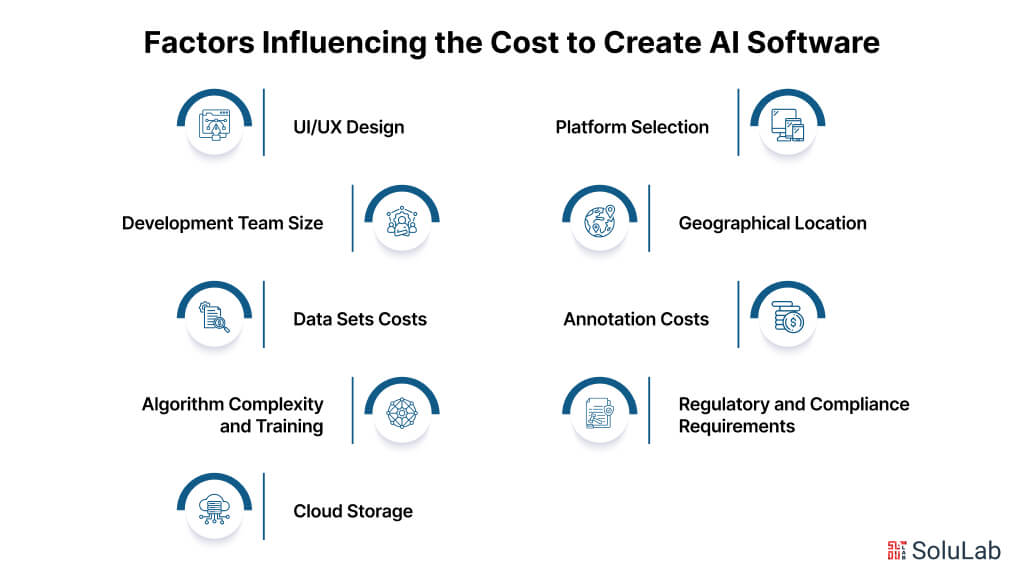
The cost to build AI software is affected by several factors, ranging from technical aspects to regulatory compliance, user experience, maintenance, and more. Let’s dive into how these elements impact the budget for developing artificial intelligence software:
-
UI/UX Design
The complexity and quality of the UI/UX design play a significant role in determining the cost of developing an AI-based software solution. Crafting an intuitive and visually appealing user experience requires additional design efforts, which directly increase the overall expenses associated with AI-driven software development.
-
Platform Selection
The platform chosen for software development, whether it be iOS, Android, or cross-platform, impacts the overall development cost. To optimize initial costs, it’s advisable to start by creating AI software for a single platform and then expand to cross-platform solutions based on market response.
-
Development Team Size
The size and structure of the development team—whether in-house, outsourced, or freelancers—are crucial in determining the costs of developing AI-assisted software. Different options carry varying financial implications. For those looking to streamline the development process and utilize advanced technology while keeping the budget in check, partnering with a dedicated outsourcing team like SoluLab is recommended.
-
Geographical Location
The location of the AI software development companies offering development services significantly affects the cost to create AI software.
App Development Rates by Region:
- Eastern Europe: $60 – $70
- Asia: $40 – $50
- America: $100 – $120
- Africa: $20 – $40
-
Data Sets Costs
The choice between proprietary and open-source data sets can also affect the final costs of developing software using artificial intelligence. While open-source datasets are typically free, processing them can add to the budget. Conversely, obtaining licenses for proprietary datasets involves additional costs, which can vary based on the size and quality of the data.
-
Annotation Costs
The total annotation costs can contribute to the overall expense of developing AI software. Factors such as the complexity of the data and the annotation method used influence these costs. For complex data, such as images, meticulous annotation techniques are necessary, which can result in higher costs. The cost and accuracy of manual human annotation versus automated approaches also vary.
-
Algorithm Complexity and Training
The complexity of AI algorithms, such as deep learning neural networks, significantly influences the development costs. More complex algorithms require additional time and computational resources for training, leading to higher expenses.
-
Regulatory and Compliance Requirements
Industries like healthcare, finance, and legal have strict regulatory requirements (e.g., HIPAA, GLBA, GDPR). Developing AI software that complies with these regulations may necessitate specialized expertise, extensive testing, and thorough documentation, all of which contribute to increased costs. Custom Software Development examples often highlight the impact of such regulations on project budgets.
-
Cloud Storage
Cloud storage also adds to the overall cost to build AI software. Three main factors—data volume, access frequency, and the chosen cloud service provider—affect these costs. Higher data volumes and frequent access to stored data increase expenses. Cloud storage costs vary across different providers, making it essential to carefully compare available options.
These factors, along with the nature of the project, whether it involves Generative AI CRM Systems determine the overall cost of creating effective artificial intelligence software.
How Can SoluLab Help You Build AI Software That Ensures Maximum ROI?
Artificial Intelligence is essential for crafting software that emulates human intelligence, facilitates smart decision-making, and streamlines everyday tasks. Its growing impact across industries is evident, driving enhanced customer service experiences and providing a competitive advantage to businesses. AI’s adaptability and promise are showcased in various fields, including fintech, social media, telemedicine, and more. It opens up new possibilities, fosters growth, and propels innovation. To achieve robust AI-powered software, the expertise of professionals in the field is indispensable.
SoluLab, a leading AI software development company, has a successful track record of delivering innovative AI solutions that bring your AI aspirations to life. Our team of experienced professionals excels in harnessing AI’s capabilities across different industry sectors, ensuring you achieve the maximum return on your investment. By collaborating with us, you can leverage our Generative AI development services to drive innovation, enhance customer experiences, and maintain a competitive edge in today’s dynamic market. We recently launched the project at SoluLab: AmanBank.
Amanbank, with over 18 years of banking expertise, holds a significant 35% market share in Libya and manages a capital of 300 million Libyan Dinars. Serving approximately 750,000 customers, Amanbank has established itself as a key player in the Libyan banking sector. Recently, SoluLab collaborated with Amanbank to launch a Generative AI-powered Mobile Banking Solution. This advanced solution integrates cutting-edge AI technologies, including chatbot and voice AI capabilities, enabling Amanbank to provide enhanced, personalized banking experiences for its extensive customer base. Contact us today to embark on your AI journey with us and discover the transformative power of AI-driven solutions that can turn your business visions into reality.
FAQs
1. What are the key steps involved in building AI software?
Building AI software involves several key steps: defining the problem, collecting and preparing data, selecting the right AI model, training and testing the model, deploying the model into production, and continuously monitoring and improving the system.
2. How important is data in the AI software development process?
Data is crucial in AI software development, as the quality and quantity of data directly impact the accuracy and effectiveness of the AI model. Proper data collection, cleansing, and preparation are essential steps in building successful AI software.
3. What types of AI models can be used in AI software development?
The choice of AI model depends on the specific problem you’re addressing. Common types of AI models include supervised learning models (e.g., regression and classification), unsupervised learning models (e.g., clustering), reinforcement learning models, and deep learning models.
4. How do you ensure the AI model is effective before deploying it?
Before deployment, the AI model should be thoroughly tested using a separate validation dataset to evaluate its performance. Metrics such as accuracy, precision, recall, and F1 score are commonly used to measure effectiveness. Iterative testing and refinement may be necessary to achieve optimal results.
5. What are the best practices for maintaining AI software post-deployment?
Post-deployment, it’s important to monitor the AI software continuously to ensure it performs as expected. This includes tracking performance metrics, updating the model with new data, addressing any issues that arise, and making improvements as needed to keep the software aligned with changing business requirements.



